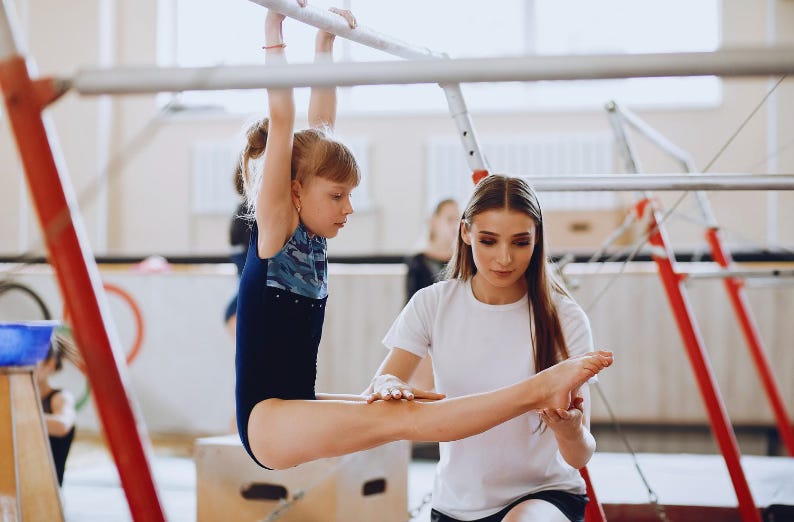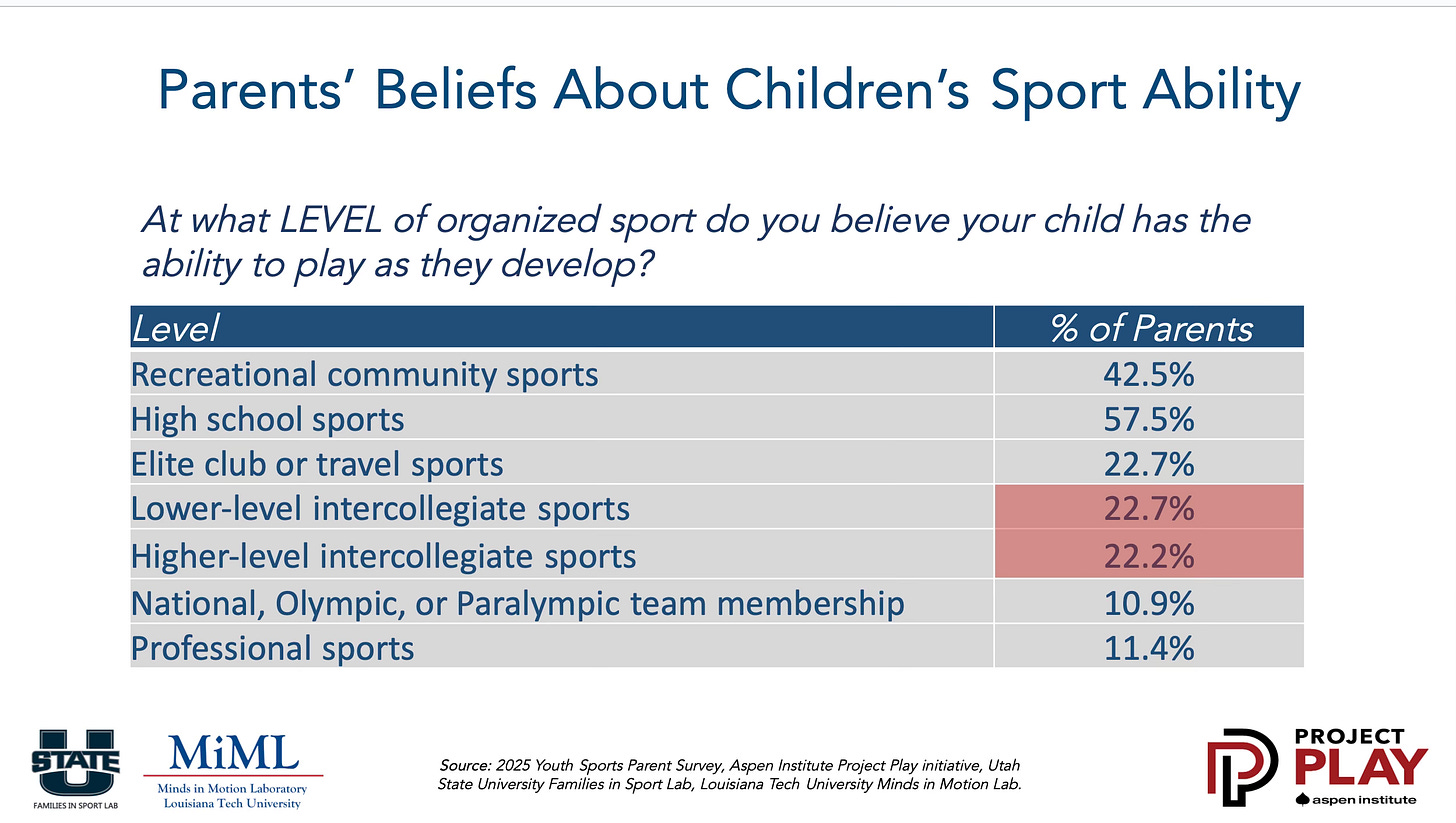Survey Says: Stunning Number of Parents Believe Their Kid Might Go Pro
Takeaways from Project Play Summit 2025 and the new sports parenting survey.
Good Game is a 1-2x/week newsletter speaking the language of youth sports parents. Please consider becoming a paid subscriber to support our efforts to educate and empower everyone with a stake in youth sports.
Last week, I was fortunate to not only attend Project Play’s annual summit, but stand on a podium in a packed room to share my thoughts on a comprehensive new sports parenting survey presented by Travis Dorsch (Utah State University), Jordan Blazo (Louisiana Tech University), and Nicole Bolter (San Francisco State University).
This was my first Project Play Summit, and wow, was I impressed. The summit brings together a plethora of thought leaders and heavy hitters from the youth sports world and beyond. Oh hi, Michael Lewis. Yes that Michael Lewis. The panels ranged from discussing innovations to school sports at a crossroads to getting more Latinas in the game to injury prevention and so much more. A lot of deep conversations were had and ideas shared.
But today, I want to focus on the State of Play 2025 Parent Survey which was unveiled ahead of the summit. While there was much fascinating data from the almost 2000 youth sports parents who were surveyed (more of that below), there was one stat that almost made my eyeballs pop.
11.4% of parents believe their kid has the ability to play professional sports.
No really. This slide shows a more comprehensive view.
The researchers highlight the bloated percentage of parents who believe their children have the ability to play intercollegiate sports. That number is interesting as well given the reality that only about 1-5% of athletes, sport dependent, make it to the collegiate level. I don’t find this number quite as shocking given that this survey was conducted with parents of athletes at all ages and levels. Collegiate sports are muddled with the various levels of play and entry points. I can see where some parents, especially of younger kids, would think, why not my kid.
But there can be no mistake about the 11.4% of parents surveyed that believe their kid might one day be paid to play sports. In so many ways this encapsulates the core issues with youth sports. Parents throw ungodly sums of money into the youth sports pot. An unhealthy combination of club/travel programs and parents put unwarranted pressure on kids. The organization tries to present the mirage that there will ultimately be an ROI. The parent eat it up. The cost of everything rises (because parents are willing to pay), making the socio-economic inequity in youth sports even more severe. Sure, there are parents who throw money at the youth sports machine just because their kid loves the sport, being part of team, and because the parent can afford it. More power to them. And, of course a couple of those kids might actually go pro. But man, that’s a lot of parents setting themselves (and their kids) up for disappointment.
Two of my colleagues who also spoke at the summit in response to the survey had fascinating opposing viewpoints on this 11.4% stat. Ian Goldberg of iSport360 had a similar WTF reaction. He was equally stunned and dismayed. Asia Mape of Ilovetowatchyouplay.com, on the other hand, lauded the notion of believing in and chasing your dreams. She thought there was nothing wrong with reaching for the stars. The joy she expressed in support of believing your kid could go pro definitely made me feel like a Debbie Downer. That said, I would veer more toward Asia’s point of view if it were kids answering the survey, not parents.
(Side note: It was so awesome to meet Asia and Ian in person. If you like this newsletter, you will love theirs too.)
A few more takeaways from the survey:
Parents spend more of travel/lodging than any other aspect of youth sports
This number is even more worrisome when you consider the researchers grouped parents into four buckets related to their time and money investments in youth sports. Only 129 were categorized as high spending , 136 were high time commitment, 604 were average time and money spent, and a whopping 824 were put in the low money/low time commitment bucket. That indicates a significantly higher expenditure from all but the last group.
This slide grabbed my attention and become the focus of my speaking time. One glance and all I could think about was how much the explosion of the youth sports tournament vacation industry is making an impact. In youth baseball, Cooperstown used to be the sole rite of passage, baseball-vacation-of-a-lifetime for the 12-year-olds who could afford it. There was typically fundraising involved and it felt very sacred for those kids lucky enough to partake. Now there’s Omaha, the “Cal Ripken Experience” in Myrtle Beach, spring training tourneys in Arizona and more. There are basketball tourneys in Las Vegas, soccer and LAX tourneys all over the country. These can be great fun for those with money trees growing in their backyards. But it’s unreachable for so many. And if you’re a family who can take one vacation a year, is this how you want to spend it? Maybe. Or maybe you’d rather do like 5 million other things.
Of course, so many organizations are glomming onto this trend and marketing themselves as going to this or that tourney. The reality is, in most cases, the kids don’t have to qualify or earn anything to partake. And now with Unrivaled Sports on the scene, this industry is exploding. Unrivaled already owns and operates fifteen facilities, some of which are offering new sports vacations rooted in everything from flag football to snowboarding. One of their facilities, Rocker B Ranch, is a multisport complex that boasts of resort-like amenities on a rustic ranch, outside of Ft. Worth, Texas. Unrivaled also own Cooperstown All-Star Village, which they hysterically label a resort. I’ve been there and it’s very cool and special but, in no way, resembles a resort. It won’t be long until Unrivaled makes international sports travel tournaments the norm. All the while, most of these travel tournaments utilize a State-to-Play rule, a gross preying on parents that I have dubbed “the most infuriating money grab in youth sports”
We spend more time than we realize on youth sports
Youth sports parents surveyed spend an insane 3:23 hours DAILY on fiduciary roles. This was split into 18 minutes popping food, 28 minutes driving, 30 minutes of laundry, 65 minutes attending and 62 minutes communicating. An hour of logistics. Yikes.
Free play still exists, yay!
Parents reported their kids spent about two hours each week on free play, making it essentially equal to the time spent on individual training or playing in organized games. Coach-led training topped the 2.5 hour mark. This is great news given the demands of organized sports. The importance of free play cannot be overstated. Not only is it fun, it allows kids to be creative and learn to problem solve in ways that don’t exist in a coach-led program. Free play should be exalted and encouraged. I would LOVE to see some competitive organizations build free play into their programs. For example, if a soccer team has three practices a week, make one of them a free play scrimmage or build it in biweekly. I would run, not walk to a program with such an offering.
Let’s end on a positive note Check out Project Play to read more on the sports parenting survey.
Are you surprised by any of these numbers? Should we believe our kids have a chance to go pro? Would love to hear your thoughts!









Twenty years ago this was also the trend. I saw parents, at the high school level, move their child from school to school, because the coach didn't recognize the "talent" of their child. Both of my children played on state level travel teams. I never thought either of them would play beyond high school. I knew then that there were a lot more academic scholarships that went unused than athletic scholarships. That is true today as well. Parents, if you want your child to succeed, use 10% of the amount you would spend on chasing athletics and put that into academic pursuits. Much much more ROI.
So good! Sorry I missed you at PP, was a great event for sure.